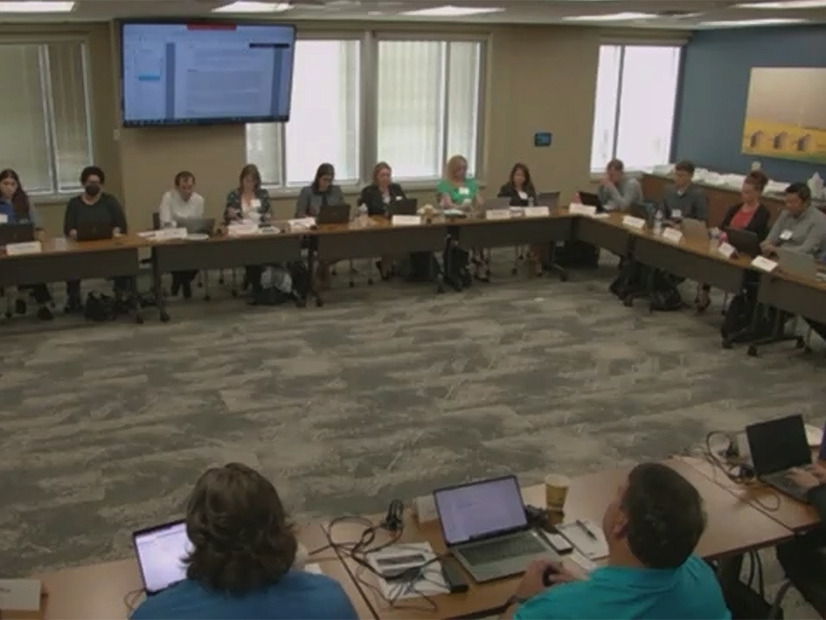NERC’s Standards Committee moved forward on more than half a dozen standards projects during a busy meeting on Wednesday. While the committee usually meets by conference call each month, Wednesday’s gathering was held in person at the headquarters of the Midwest Reliability Organization in St. Paul, Minn.
Push for Formal Comment on SAR
First on the agenda at Wednesday’s meeting was a standard authorization request (SAR) to modify reliability standard MOD-031-3 (demand and energy data), in order to allow planning coordinators to obtain existing and forecasted information on distributed energy resources (DER) from distribution providers and transmission planners. NERC’s System Performance Impact of Distributed Energy Resources Working Group (SPIDERWG) developed the SAR, which was endorsed by the Reliability and Security Technical Committee (RSTC) in June.
NERC staff brought the SAR to the Standards Committee with a proposal to authorize posting it for an initial 30-day informal industry comment period, which raised eyebrows with some members. SPP’s Charles Yeung asked why the proposal was not for a formal comment period, which would require the SAR drafting team to address comments in the final draft SAR.
Latrice Harkness, NERC’s director of standards development, explained that under recent changes to NERC’s Standards Processes Manual, formal comment may not be required for SARs proposed by the RSTC. However, Yeung observed that the SAR actually was proposed by the SPIDERWG, and while that group does report to the RSTC, he asked whether the full RSTC had provided input into the SAR. Chair Amy Casuscelli of Xcel Energy confirmed that it had not.
As a result Yeung moved to modify the proposal to post the SAR for a formal comment period. After the motion was seconded, the committee approved it unanimously.
FERC Winter Weather Project Moves Forward
Next, the committee turned to FERC’s order to update TPL-001-5.1 (transmission system planning performance requirements), which the commission issued at its June meeting. (See FERC Approves More Extreme Weather Rules.)
FERC found that the current reliability standards do “not obligate transmission planners and planning coordinators to consider extreme hot and cold weather in their transmission planning assessments.” The commission gave NERC the choice of either updating TPL-001-5.1 or creating a new standard that contains such a requirement (RM22-10); the SAR submitted by NERC staff did not specify which option the project should choose, but left the decision to the SAR drafting team.
Like the previous SAR, the proposal that NERC staff brought to the meeting would authorize posting the draft SAR for an informal rather than a formal comment period of 45 days. In this case, the change was because the project was ordered by FERC, and NERC’s Rules of Procedure allow such projects to skip the formal comment phase.
Although members discussed changing this proposal to require a formal comment period as well, a NERC staffer noted that “many issues behind the directive were fully litigated in the FERC proceeding, so our hands are tied to some extent.” The staffer also reminded attendees that NERC must submit the new or modified standard by December 2024, and suggested that because “traditionally TPL revision projects have taken some time,” the standard drafting team’s (SDT) time would be better used focusing on the standard rather than replying to industry comments.
After this exchange, the committee voted unanimously to approve the proposal as written.
Other Standards Actions
The remaining items attracted little comment, though in some cases members asked NERC staff to make minor changes to wording for proposals that were going out for public comment. The approved items were proposals to:
-
- Add members to the SDT for Project 2021-03 (CIP-002);
- Accept the SAR for Project 2022-05 (modifications to CIP-008 reporting threshold);
- Accept the SAR for Project 2022-04 (EMT modeling);
- Post proposed reliability standards EOP-004-5, PRC-002-5, and PRC-028-1 (found on pages 69, 108, and 156 of the agenda) for 45-day formal comment and ballot periods; and
- Post proposed revisions to NERC’s definition of Area Control Error Diversity Interchange for a 45-day formal comment and ballot.




